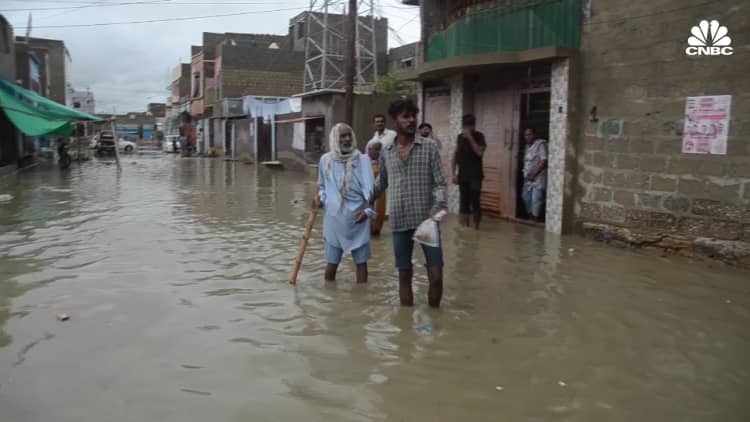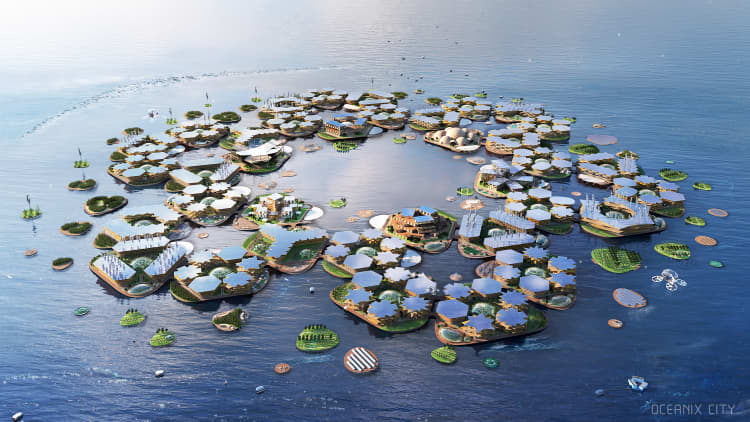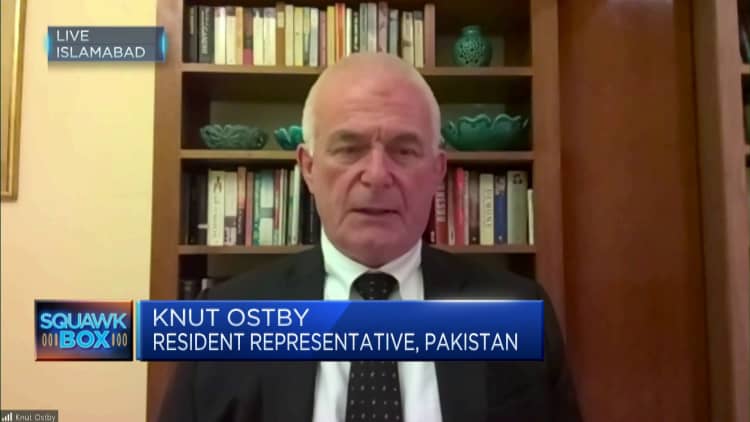Climate reparations ethical but not best fix: Climatologist
Displaced people in floodwater after heavy monsoon rain at Usta Mohammad city, in the Jaffarabad district of Balochistan province, on Sept. 18, 2022. Thirty-three million people have been affected by the floods in Pakistan, which started with the arrival of the monsoon in late June.
Fida Hussain | Afp | Getty Images
Calls for climate reparations for poorer countries hit hard by climate change are growing louder after catastrophic floods in Pakistan. But though they may be ethical, they aren’t the best solution to a complex problem, one climatologist said.
“[Climate reparations are] the ethical thing to do,” said Friederike Otto, a climatologist at the University of Oxford, “but a more equitable world is much better able to solve the complex crises we deal with. If all parts of society are involved in decision-making, ultimately everyone will be better off.”
Pakistan’s floods have killed nearly 1,700 so far. They’ve also resulted in at least $30 billion in economic losses, according to government estimates.
Thirty-three million people have been affected by the floods, which started with the arrival of the monsoon in late June, and were caused in part by melting glaciers. More than a third of the country is under water.
Pakistan was among the 10 countries in the world that are most affected by climate change in the past two decades, according to data by Germanwatch’s Climate Risk Index. Yet, the South Asian country is responsible for less than 1% of global emissions, its government said.
The top contributors of carbon dioxide emissions are China, the United States and India, data from the United States Environmental Protection Agency showed.
Not a straightforward solution
Climate reparations refer to the monetary compensation the world’s largest emitters give to developing countries bearing the brunt of climate change.
However, though climate reparations appear to be a relatively straightforward solution, their implementation isn’t, Otto said.
There needs to be assurance that the funds will directly benefit those that suffered losses, she said. At the same time, for climate reparations to be successful, there needs to be an official classification of weather and climate events and natural hazards, she added.
“An IPCC task force on emission metrics exists. We could do the same for identifying metrics to measure climate impacts. The more difficult aspect for reparations to be successful would be to ensure that victims will benefit,” Otto said, referring to the Intergovernmental Panel on Climate Change, and adding that this will depend on good governance.
Her comments come amid mounting pressure on wealthier countries to remedy the damage that the climate crisis has inflicted on developing nations.
Knut Ostby, the United Nations Development Programme’s resident representative in Pakistan, said rich countries should ramp up climate financing for countries like Pakistan which are reeling from climate disasters.
“Promises have been made about financing for climate adaptation for countries hit by climate impact like Pakistan,” Ostby told CNBC’s “Squawk Box Asia” in mid-September.
“I think this financing has to increase,” he added.

The U.N. representative urged rich countries to consider debt relief and debt swaps as one of the tools to alleviate the financial costs incurred by affected countries. “Countries with debts to countries impacted by climate change can give relief on this debt in exchange for the countries investing in climate adaptation actions,” he said.
Andrew King, a senior lecturer at the University of Melbourne, is another proponent of climate reparations. It is “unfair” for nations who have contributed little to the problems of climate change to bear the brunt of its impact, he said.
Such countries have less “adaptive capacity” to climate change and less resilience to current extremes, so support is needed to ease the burden they face, he told CNBC.
‘There will be more Pakistans’

And climate disasters are likely to take place with greater frequency across the world.
“Many tropical nations such as India are at increased risk of coastal flooding,” said King. “These nations face risks from dangerous humid heat that can be harmful to health,” he added, acknowledging that heat waves across the globe have been increasing in intensity and frequency. On top of that, extreme rainfall is on the rise and droughts have been worsening, he said.
India’s average maximum temperature in March was the highest average maximum in 122 years.
“There will be more Pakistans,” Ostby said. “There are already more Pakistans.”
A better way forward?
Otto, however, said “the most important preparation” is for vulnerable countries to invest in social security, health care and education.
While developed countries are partly responsible for climate change, local authorities in vulnerable countries also have a responsibility to provide proper planning and education on the appropriate responses to early warnings to climate events, she said.

Displaced people in floodwater after heavy monsoon rain at Usta Mohammad city, in the Jaffarabad district of Balochistan province, on Sept. 18, 2022. Thirty-three million people have been affected by the floods in Pakistan, which started with the arrival of the monsoon in late June.
Fida Hussain | Afp | Getty Images
Calls for climate reparations for poorer countries hit hard by climate change are growing louder after catastrophic floods in Pakistan. But though they may be ethical, they aren’t the best solution to a complex problem, one climatologist said.
“[Climate reparations are] the ethical thing to do,” said Friederike Otto, a climatologist at the University of Oxford, “but a more equitable world is much better able to solve the complex crises we deal with. If all parts of society are involved in decision-making, ultimately everyone will be better off.”
Pakistan’s floods have killed nearly 1,700 so far. They’ve also resulted in at least $30 billion in economic losses, according to government estimates.
Thirty-three million people have been affected by the floods, which started with the arrival of the monsoon in late June, and were caused in part by melting glaciers. More than a third of the country is under water.
Pakistan was among the 10 countries in the world that are most affected by climate change in the past two decades, according to data by Germanwatch’s Climate Risk Index. Yet, the South Asian country is responsible for less than 1% of global emissions, its government said.
The top contributors of carbon dioxide emissions are China, the United States and India, data from the United States Environmental Protection Agency showed.
Not a straightforward solution
Climate reparations refer to the monetary compensation the world’s largest emitters give to developing countries bearing the brunt of climate change.
However, though climate reparations appear to be a relatively straightforward solution, their implementation isn’t, Otto said.
There needs to be assurance that the funds will directly benefit those that suffered losses, she said. At the same time, for climate reparations to be successful, there needs to be an official classification of weather and climate events and natural hazards, she added.

“An IPCC task force on emission metrics exists. We could do the same for identifying metrics to measure climate impacts. The more difficult aspect for reparations to be successful would be to ensure that victims will benefit,” Otto said, referring to the Intergovernmental Panel on Climate Change, and adding that this will depend on good governance.
Her comments come amid mounting pressure on wealthier countries to remedy the damage that the climate crisis has inflicted on developing nations.
Knut Ostby, the United Nations Development Programme’s resident representative in Pakistan, said rich countries should ramp up climate financing for countries like Pakistan which are reeling from climate disasters.
“Promises have been made about financing for climate adaptation for countries hit by climate impact like Pakistan,” Ostby told CNBC’s “Squawk Box Asia” in mid-September.
“I think this financing has to increase,” he added.

The U.N. representative urged rich countries to consider debt relief and debt swaps as one of the tools to alleviate the financial costs incurred by affected countries. “Countries with debts to countries impacted by climate change can give relief on this debt in exchange for the countries investing in climate adaptation actions,” he said.
Andrew King, a senior lecturer at the University of Melbourne, is another proponent of climate reparations. It is “unfair” for nations who have contributed little to the problems of climate change to bear the brunt of its impact, he said.
Such countries have less “adaptive capacity” to climate change and less resilience to current extremes, so support is needed to ease the burden they face, he told CNBC.
‘There will be more Pakistans’

And climate disasters are likely to take place with greater frequency across the world.
“Many tropical nations such as India are at increased risk of coastal flooding,” said King. “These nations face risks from dangerous humid heat that can be harmful to health,” he added, acknowledging that heat waves across the globe have been increasing in intensity and frequency. On top of that, extreme rainfall is on the rise and droughts have been worsening, he said.
India’s average maximum temperature in March was the highest average maximum in 122 years.
“There will be more Pakistans,” Ostby said. “There are already more Pakistans.”
A better way forward?
Otto, however, said “the most important preparation” is for vulnerable countries to invest in social security, health care and education.
While developed countries are partly responsible for climate change, local authorities in vulnerable countries also have a responsibility to provide proper planning and education on the appropriate responses to early warnings to climate events, she said.

